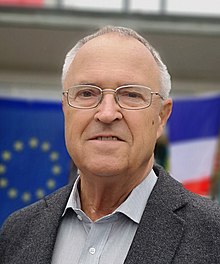
Back هانز أيشيل Arabic هانز ايشيل ARZ Hans Eichel Danish Hans Eichel German Hans Eichel Esperanto هانس آیشل Persian Hans Eichel French ハンス・アイヒェル Japanese Ioannes Eichel Latin Hans Eichel NDS
Hans Eichel | |
|---|---|
 | |
| Federal Minister of Finance | |
| In office 12 April 1999 – 22 November 2005 | |
| Chancellor | Gerhard Schröder |
| Preceded by | Oskar Lafontaine |
| Succeeded by | Peer Steinbrück |
| Minister President of Hesse | |
| In office 1 April 1991 – 7 April 1999 | |
| Deputy | Joschka Fischer Rupert von Plottnitz |
| Preceded by | Walter Wallmann |
| Succeeded by | Roland Koch |
| President of the Federal Council | |
| In office 1 November 1998 – 23 April 1999 | |
| President | Roman Herzog |
| Chancellor | Gerhard Schröder |
| Preceded by | Gerhard Schröder |
| Succeeded by | Roland Koch |
| Personal details | |
| Born | 24 December 1941[1] Kassel, Germany |
| Signature | |
Hans Eichel (born 24 December 1941) is a German politician (SPD) and the co-founder of the G20, or "Group of Twenty", an international forum for the governments and central bank governors of twenty developed and developing nations to discuss policy issues pertaining to the promotion of international financial stability.
He was Germany's Minister of Finance between 1999 and 2005. Eichel was chairman of the G7 in 1999 and chairman of the G20 in 2004.[2] Before that, Eichel served as the 6th Minister President of Hesse from 1991 to 1999 and as the 52nd President of the Bundesrat in 1998/99.
During his time in office, Eichel played a very important role in two landmark reforms – the far reaching reform of German society and economy (also known as Agenda 2010) and the creation of the G-20 to reflect the rebalancing of world power. Some argue that Agenda 2010 helped turn Germany from the 'sick man of Europe' into the best performing major Western economy in the aftermath of the global financial crisis. While some parties regarded it as the most successful economic reforms in Germany in over half a century, as well as in any G7 country in 30 years, it also created massive controversy and protests.[3][4][5][6] The effects of the Agenda 2010 on German economic development remain disputed.[7]
As chairman of the G7, Eichel initiated the creation of the G20 together with then US Treasury Secretary Larry Summers and hosted its inaugural meeting in Berlin. The G20 rapidly grew to become the most influential economic body in the world.[8] Eichel went on to serve as chairman of the G20 in 2004, when he pressed for the reforming of the international financial architecture and establishing a code of conduct on preventing financial crises.
- ^ "Hans Eichel". Hans-eichel-kassel.de. 24 December 1941. Retrieved 14 April 2022.
- ^ Kirton, Professor John J. (28 March 2013). G20 Governance for a Globalized World. Ashgate Publishing. ISBN 9781472404503.
- ^ Eric Lam (28 December 2011). "Canada's economy second-best among G7: BMO - Financial Post". Financial Post.
- ^ Larry Elliott (6 March 2003). "Europe's powerhouse in crisis". the Guardian.
- ^ "The economy: Dissecting the miracle - The Economist". The Economist. 13 June 2013.
- ^ "Mehr als 470.000 protestieren gegen den Sozialabbau". 19 May 2010.
- ^ Böcking, David (12 March 2013). "Warum die Agenda 2010 eine unverstandene Reform ist". Der Spiegel.
- ^ "G20 - The Treasury". Archived from the original on 14 January 2014.
© MMXXIII Rich X Search. We shall prevail. All rights reserved. Rich X Search